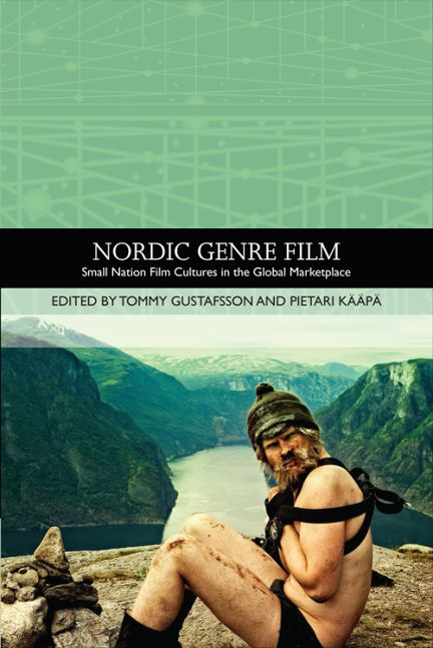Book contents
- Frontmatter
- Contents
- List of Illustrations
- List of Contributors
- Traditions in World Cinema
- Introduction: Nordic Genre Film and Institutional History
- PART I HERITAGE CINEMA AND NATIONAL NARRATIVES
- 1 Sibelius and the Re-emergence of the Great Man Biopic
- 2 Whose Repressed Memories? Max Manus: Man of War and Flame–Citron (from a Swede's Point of View)
- 3 Voices from the Past – Recent Nordic Historical Films
- PART II CRIME AND DETECTIVE NARRATIVES
- PART III NORDIC OPTIMISM: ROAD MOVIES, COMEDIES AND MUSICALS
- PART IV NORDIC HORRORS
- PART V GENRE BENDERS
- Index
1 - Sibelius and the Re-emergence of the Great Man Biopic
from PART I - HERITAGE CINEMA AND NATIONAL NARRATIVES
Published online by Cambridge University Press: 25 October 2017
- Frontmatter
- Contents
- List of Illustrations
- List of Contributors
- Traditions in World Cinema
- Introduction: Nordic Genre Film and Institutional History
- PART I HERITAGE CINEMA AND NATIONAL NARRATIVES
- 1 Sibelius and the Re-emergence of the Great Man Biopic
- 2 Whose Repressed Memories? Max Manus: Man of War and Flame–Citron (from a Swede's Point of View)
- 3 Voices from the Past – Recent Nordic Historical Films
- PART II CRIME AND DETECTIVE NARRATIVES
- PART III NORDIC OPTIMISM: ROAD MOVIES, COMEDIES AND MUSICALS
- PART IV NORDIC HORRORS
- PART V GENRE BENDERS
- Index
Summary
The popular Finnish biopic film Sibelius (Timo Koivusalo, 2003) about the composer Jean Sibelius (1865–1957) is a textbook example of a biopic – so obvious, in fact, that there is a touch of banality involved. There seems to be very little in the film we do not already know – ‘we’ referring here primarily to Finnish audiences or experts on biographies of classical composers. Despite the fact that parts of the film were shot in Latvia and Italy, the film is quite clearly targeted at domestic markets, as it relies on a nationally oriented and nationally limited knowledge of the past. Every element we may expect to be in the film is there: every character involved in cultural life around the fin de siecle, every piece of music, every political event.
Up to a point, this is typical of many historical films. In her book Cinematic Uses of the Past Marcia Landy (1996: 19) stresses the element of foreseeability in the genre: ‘Melodrama and history feed on familiarity, ritualization, repetition, and overvaluation of the past to produce a deja vu sense of “Yes, that is the way it was and is”.’ Further, we might see here a connection to the notion of banal nationalism as introduced by Michael Billig (1995), nationalism as conscious and unconscious everyday practices and habitual patterns of social life that likewise rely on familiarity and unending repetition.
And yet, in all its banality Sibelius does tell us about the past and it does resonate with what we think about certain aspects of Finnish, Russian and European history. The aim of this chapter is to consider Sibelius as a popular historical narrative, discussing it in relation to the mechanisms of historical explanation as well as the mode of argument and address used in the film. As reference points I shall discuss certain other Nordic biopics made during the last few years. Biopic seems to be one of the prominent genres in Scandinavia in the 2000s. Monica Z (2013), for example, has been a huge success in Sweden, and Kon-Tiki (2012) – on the Norwegian explorer Thor Heyerdahl – broke into international markets and became a Norwegian Academy Award nominee.
- Type
- Chapter
- Information
- Nordic Genre FilmSmall Nation Film Cultures in the Global Marketplace, pp. 21 - 32Publisher: Edinburgh University PressPrint publication year: 2015



